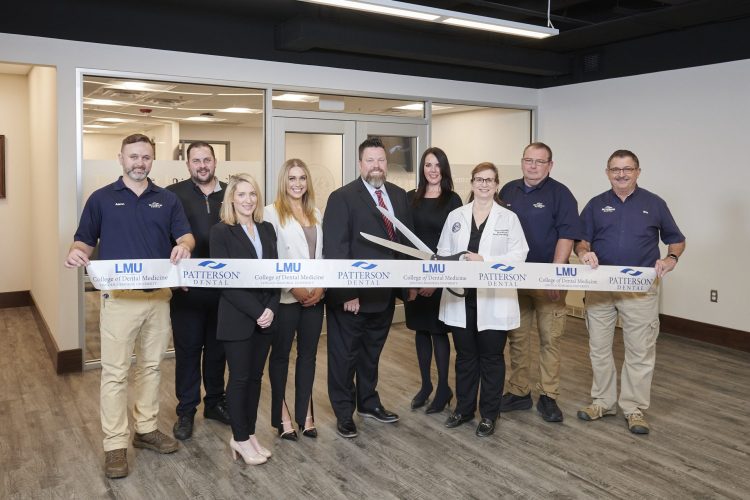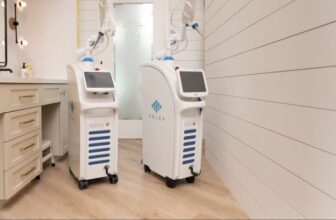
Read Time:11 Minute, 40 Second
Patterson Dental Helps Turn an Old Hospital into the Lincoln Memorial University – College of Dental Medicine
In August 2020, Denise Terese-Koch, DDS, MBA, EdD, was selected as the founding dean of Lincoln Memorial University – College of Dental Medicine (LMU-CDM) in Knoxville, Tennessee. Her credentials include 23 years of private practice in Chicago, serving as group leader of the faculty practice at the University of Tennessee Health Science Center College of Dentistry, opening the postdoctorate advanced education and general dentistry program at Tomah VA Medical Center in Wisconsin, and opening the dental hygiene and dental assisting programs at South College in Nashville. During the selection process, the LMU board interviewed many candidates for the dean position. “From what I understand,” Dr. Terese-Koch recalled, “my thought process about what the dental school should be and what we needed aligned with theirs.”
A Unique Educational Approach
Dr. Terese-Koch believes that educating dental students should take a humanistic, student-centered approach. She also believes it should be integrative. “Meaning, the students should not be taught the biomedical sciences and the dental clinical sciences as silo subject matters,” she explained. “They need to learn them in an integrative manner to enable their critical thinking skills to start earlier so that by the time they are D4 students, they understand the process of care. Our vision is for the students’ critical thinking to advance each year, increasingly maturing during their four years of education to set them up on the best path for success upon graduation.”
Dr. Terese-Koch also believes the school should focus on the private-practice model of dentistry. To that end, the school created clinics as simulated private practices. “Our macro clinical environments revolve around real life dental practice design; 10 chairs, a sterilization center, business center and central supply – it reflects a real world working environment and clinical atmosphere,” she explained. Two attending doctors function as practice owners and the students serve as associates. The school also integrated dental hygiene students into this structure to “truly mimic what a private practice is about,” explained Dr. Terese-Koch.
“In this private-practice model, students are responsible for patient scheduling, managing their supplies, handling sterilization and understanding the business side of dentistry, including insurance submission and payment collection,” Dr. Terese-Koch said. “They’ll take part in business exercises, with the goal of challenging students to answer questions like: What was your production and what was your collection? How much did it cost to administer care? What are your fixed expenses? What are your variable expenses? We want them to understand what it’s truly like to be an entrepreneur and own and run a dental practice. LMU’s graduates essentially receive a full four-year curriculum in the business of dentistry in addition to their doctorate.”
Dr. Terese-Koch and faculty strongly believe this approach will provide LMU’s graduating students with the insights and skills they need to be successful business owners. “Through our focus on the business side of dentistry, we are providing our students with a superior model of operational understanding. To truly run a successful dental practice, or any business, it is important to understand the roles of each member of the team and how they contribute to a practice’s everyday success. If they decide to begin as associates they will start off with a far superior foundation and can continue to build their respective clinical and practice management skills, ensuring that they can become an effective private practice owner, should they desire,” Dr. Terese-Koch said. “We’re providing them with more tools in their toolbox to become well-rounded dentists so they have more options.”
The fact that Dr. Terese-Koch isn’t primarily an academician may account for this unique approach and curriculum. “First and foremost, I’m a dentist,” she said. “I did the job every day for 23 years. I understand the practice of dentistry and practice ownership, and I felt that was missing in dental education. So, we’re trying to find a happy medium between making sure we meet or exceed all the code of standards, while providing students something more during the process that they truly need. Dental students have long expressed dissatisfaction about not getting enough practice management experience in dental school.”
Dr. Terese-Koch has made implants another major aspect of the school’s curriculum. “Our students are required to place and restore a minimum of 12 implants during their D3 and D4 years,” she said. “Additionally, we introduce LMU students to I.V. sedation, so they understand what that’s all about. Letting them work with specialists ensures we’re developing a superior level of highly capable general dentists. Those who want to specialize will be extremely competitive candidates during the selection process when they apply to postdoc programs.”
In addition to a Doctorate of Medicine in Dentistry, LMU-CDM offers three exceptional dual-degree programs – a Master of Business Administration and a Master of Science in Forensic Dentistry. During their D3 and D4 years, students are eligible to “dual enroll” and earn a second degree. The school’s administration has set various benchmarks that students are required to achieve to qualify for the dual degree program.
Admissions Open

LMU-CDM accepted its inaugural class in fall of 2022, which includes 80 dental students and 30 dental hygiene students. In response to high demand, LMU has already begun planning for expansion. “We will have a maximum capacity of 120 dental students after we’ve applied for increases in our class size,” Dr. Terese-Koch explained. Students can choose from two paths to admission into the dental program. “Students who have a bachelor’s degree can directly apply or we have what’s called the guaranteed path of admissions,” explained Dr. Terese-Koch. “In our guaranteed path program, high school seniors nationwide with a 3.7 GPA who are interested in pursuing their undergraduate education at Lincoln Memorial University in Harrogate, Tennessee, at our flagship campus, can enroll in that program and have a guaranteed seat in our dental program.”
Application to the guaranteed path of admissions requires two letters of recommendation and an interview with the admissions committee. “Upon acceptance into that program, there are certain benchmarks students must achieve to remain in the program during their four years at the undergraduate campus,” the dean explained. “From there, students are required to apply through the ADEA Portal for admissions and participate in another subsequent interview. But there’s a seat waiting for you.”
The Cret Center Coup

In November 2020, LMU-CDM applied for consideration as a Center for Research and Education in Technology (CRET). By March 2021, the school was approved and awarded an Innovation Center, which is equipped with the latest innovations in digital dental technology. Because D1 students aren’t yet practicing in the clinic, faculty currently use it to provide dental care to underserved populations through funding from a $10 million grant awarded by the State of Tennessee to be used over the course of three years.
The clinic opened on September 12, 2022. Between the clinic and the mobile unit, which travels to bring much needed dental care to underserved communities, LMU-CDM faculty have engaged in 10,600 patient encounters as of late October 2022.
“To provide care to our community of 2.2 million people who do not have access to care in East Tennessee and Appalachia, Lincoln Memorial University has a mission to serve the underserved,” Dr. Terese-Koch said. “Understanding the immediate need for quality dental care in various regions across East Tennessee, we have decided to open five satellite clinics in the area within the next two years – one across from the dental school in Knoxville, one in Morristown, one in Johnson City, one in Harrogate near the flagship campus and we are currently looking for an additional site, potentially in Kingsport.”
Building A New Dental School

After being awarded the position of LMU-CDM dean, Dr. Terese-Koch, her husband and their dog moved to Knoxville from the Nashville area. Just seven months later, LMU-CDM began renovating a vacant hospital building on its campus to be the future site of LMU’s school of dental medicine, opening its doors only a year later.
During that time, according to Jason Nipper, the Patterson Dental equipment specialist leading the project, the dean simultaneously attended LMU herself and received her doctorate in education. She also developed, launched and managed some of the LMU-CDM outreach programs, donating her time at local community outreach events, personally treating underserved and homeless individuals and others with dental needs who had no access to a dentist. “She had a lot on her plate,” Nipper said.
LMU-CDM currently occupies floors three through seven and floor nine of the former hospital. Floor three houses faculty offices and lecture classroom space; floor four administrative suite, lecture facilities and classrooms, a library and a student study area; and floor five the bench lab, simulation lab, digital workflow lab and wet/dry lab. The fifth floor also includes the Performance Institute, which was developed by Promethian Dental Systems and consists of a full, comprehensive-care training module program where students use simulation, virtual reality (VR) and artificial intelligence (AI) to mimic real-life situations, enabling students to create comprehensive treatment plans and perform procedures. Objective grading of the student’s work is conducted using various VR- and AI-assisted software platforms.
“We’re trying to be very forward thinking,” Dr. Terese-Koch acknowledged. “Having the opportunity to build the dental school from the ground up is not only a challenge, but also a wonderful experience. It affords us the opportunity to encompass all of the unique advances that have happened in dentistry, all of the technology and all of the AI and VR available and incorporate them from the ground up into a state-of-the-art dental program.”
Working with Patterson Dental
Dr. Terese-Koch met with every major dental vendor before selecting Patterson Dental as LMU’s partner in November 2020. “The fact that Patterson had agreed to build the CRET Center influenced my decision to partner with them,” she explained. “I decided that with Jason Nipper being based here in Knoxville and Patterson Dental working with us on the center, it made sense to work with them to finish the other facilities.”

Dr. Terese-Koch had already selected A-dec equipment, which is the preferred choice in over 75% of U.S. dental institutions. Patterson is a market-leading distributor of A-dec equipment in sales, installation and after-sales support. Dr. Terese-Koch also found Nipper to be extremely attentive to detail and easy to work with. “He was always onsite taking care of problems,” she recalled. “During the initial planning stages, we had different challenges that we worked through together and he really was super to work with. So, it really was not a difficult decision. It was one I felt was good for LMU. Partnerships like that are hard to come by.”
Several manufacturers’ equipment and technologies are used in the CRET Center. “That challenge was made easier with one supplier for all of your dental equipment,” said Dr. Terese-Koch. “To build the CRET Center and the dental school at the same time was a huge task. And it was a lot for Patterson because each manufacturer differs a little bit. Plumbing configurations are different, cabinetry is different, color selections are different. It wasn’t easy, but it came out beautifully and it’s the largest CRET Center in the country. We’re very pleased to have it here.” Just how big a task was it? The dental school has 80 operatories, 11 of which belong to the CRET Center. Distributed among the current and future outreach clinics are another 80 operatories, allowing LMU to serve up to 160 patients in the state of Tennessee at a time.
In addition to the Patterson Dental team, the college’s architectural design team and construction partner helped on the project. Knowledgeable manufacturing partners like Heidi Denos from A-dec – who the dean described as doing the lion’s share of assisting in selecting colors for cabinetry, countertops and upholstery to ensure uniformity and the latest in design trends – also played a key role in the final outcome of LMU-CDM. “It was a really collaborative process,” Dr. Terese-Koch said. “We made custom laboratory benches and custom wall partitions in our clinics. We worked very harmoniously together to make all these things come together.”

The lab benches can seat a total of 120 students. “We need to teach the students traditional dentistry as well as digital dentistry,” Dr. Terese-Koch explained. “So, in the bench lab right now, they’re working on oral morphology and anatomy, and they’re waxing teeth so that they can make dentures in the bench lab. They’ll participate in various laboratory exercises. When we do advance each class to digital dentistry, they’ll use our digital workflow lab.”
Dr. Terese-Koch remembers students being expected to do far more lab-related processes when she was in dental school than traditional students are today. “We did everything,” she explained. “We waxed and casted our own crowns and fabricated complete dentures. We did absolutely everything. Laboratory work took significant time out of the dental education process back then. Not that it’s no longer beneficial, but now with emerging technologies, we have so much more we need to teach them in a short period of time. They need an understanding of traditional dentistry – analog dentistry – but then we’re moving them into the realm of scanning, milling and printing. What dentistry looks like today.”
Editor’s note: This article first appeared in the Winter 2023 issue of Advantage by Patterson Dental magazine.






